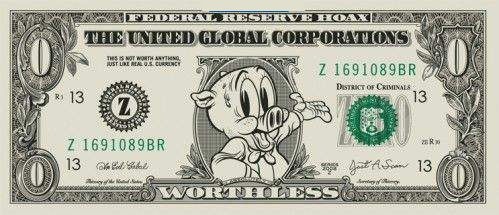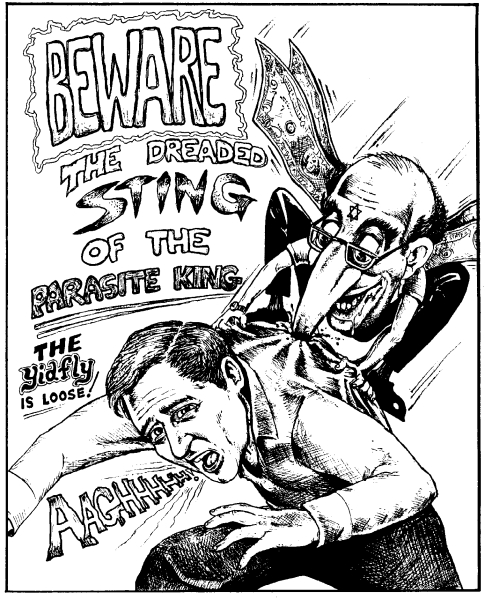The Website of Carlos Whitlock Porter
(Warning: Contains racially explicit
material. For adults only)
REVOLUTION WITHOUT GUNS
I will now discuss the question: "Why go to prison for robbing armoured cars to finance the Revolution, when there are legal ways of stealing much more money?"
We sometimes forget that stealing is legal. Of course, it is called unpleasant names, such as: breach of contract, gross negligence, wilful negligence, insolvency, and debt. But it is legal.
There is no imprisonment for debt. I know people who have stolen millions of dollars and who will never spend a day in court, except for preliminary hearings, etc. Of course, they have all kinds of lawsuits against them, but that doesn't matter. They stole legally:
Legal stealing falls into three categories:
a) the nigger method
b) the white man method
c) the Jew method, the latter being the ultimate in perfection.
Method a) consists of saying "Gimme fi' dollahs til payday", and then saying, "Cain't whup me, doan' git it". That is crude, but legal.
Method b) consists of forming a corporation (which need only exist on paper), paying your initial invoices very quickly, establishing a line of credit with a variety of suppliers (payment within 60 days of invoice, etc. etc.), taking large orders, selling off the goods, declaring insolvency, and forming another corporation. That is legal ( if you've got a smart lawyer it's legal).
Method c) consists of becoming a banker.
A banker is essentially an agent who borrows at one rate of interest and lends at another, the difference between the two interest rates constituting his profit.
If I borrow one billion dollars at 6 ¾ % interest and re-lend it at 7%, the difference between the two interest rates is 2.5 million dollars a year. The ¼% represents a slight increase in risk only. If I assume a much larger risk (for example, a much longer term loan or a shady borrower), I can mark it up 2 or 3%, which means 20-30 million dollars a year, ten times as much. In some countries, you can open a "bank" with as little as $1,000,000 in cash (called "Paid-In Capital"), maybe even $100,000. If I collect the interest for one year, I am set up for life. And if you default, the bank is a corporation. I have no personal liability. I will declare bankruptcy. They can't take my house or my car, let them take the computers and the office furniture.
I don’t even care whether you can ever repay, because it's not my money, I borrowed it. All I want is the interest. The loan contract says you've got to repay, but that's okay, I'll loan you the money to repay it with. I'll even loan you the money to pay the interest (that is called "Extending New Credits").
It is important to understand this mentality, because without it, every government and supra-governmental institution in the world would collapse in a second.
Any self-respecting tax haven (and to a lesser extent, any financial district anywhere) has dozens of banks employing perhaps half a dozen people each, in just 2 or 3 rooms in an ordinary apartment house. These "banks" have no cash. If you went in with a machine gun to rob the joint you’d get about fifteen dollars. They have no depositors. They do all their business by wire.
Now, before I collapse, of course, all these worthless loans I have extended will be entered on my books as assets, and will be used as collateral for further loans to me.
Pay careful attention now. If interest rates are at 7%, a 20-year loan (for example, a government bond) will be worth nearly face value as collateral. If interest rates rise to 8%, the face value of that same bond will fall by roughly 1/7th, because the same amount of money can now buy a bond yielding 8% (one seventh more).
If interest rates then fall ¼%, the face value of that same bond will rise by ¼ of 1/7th, or 2.8 % (in practice, much less, because of commissions, expenses, taxes, etc.).
Since this is a large price movement in long-term bonds, such bonds can be bought on credit for about 1% deposit (called "Margin").
When I get into a jam (called a "Liquidity Crisis") because of all these worthless loans I have extended, threatening a depression, in comes the argument for central banking. The central bank will act as the "Lender of Last Resort"; it will "Inject Liquidity into the Banking System".
By some curious coincidence, the central bankers, who will happen to be friends of mine, will also have centralized control over interest rates.
This means that the market value of trillions of dollars of securities will rise and fall by an exact mathematical formula according to a decision taken in utter secrecy by a very small number of people, who are my personal friends.
If you knew for a fact that the Prime Rate would be lowered by ¼ of a point next Tuesday, you could probably double your money in 2 days speculating in long-term Treasury Bonds. We hear a great deal about inside dealing in the stock market, but nothing about inside trading on the bond markets. (Related stocks and commodities, such as land, agricultural products, etc. will also rise and fall at the same time, but in a manner much more difficult to quantify and/or predict.)
In addition, central control of interest rates offers all kinds of advantages, for example, the opportunity to cause depressions.
Depressions are often considered a failure of the financial system, but that is not so. Depressions represent the success of the system. They are a requirement of the system. They make the system successful. They create a buying opportunity for speculators and act to liquidate debt.
The only problem is that liquidating
trillions of dollars worth of government debt means liquidating a currency and
government. This is far more complex than simply liquidating a corporation. To
do so successfully requires a revolution or the loss of a war [IRAQ], and preferably
both. No revolutionary government will pay principal and interest on the debts
of a system it has overthrown. But you need a new government and a new
currency.

So, the situation is as follows. The bankers need a revolution to repudiate their debts, so they can start the borrowing merry-go-round again. We have a "Revolution For Sale". I propose a deal.
They "throw the fight", we take
over the government, they repudiate all U.S. dollar debts, and begin
re-borrowing, blaming us for the repudiation. They get a lucrative cut in the
printing and credit expansion of our own new, equally worthless new currency
(hereinafter referred to as the "Imitation Jewbucknik", or
JIMBUCKNIK) [the AMERO], in the trading of our own new, equally worthless government bonds
(known as JIMBONDS), and centralized control of interest rates under our own
new, Revolutionary Government.
They are happy, we are happy.
Then we break our word to them and shoot all the bankers.
CARLOS W. PORTER
1991 (revised 2001)

MADE IN RUSSIA - THE HOLOCO$T
Return to ARTICLES PAGE
Return to CONTENTS PAGE